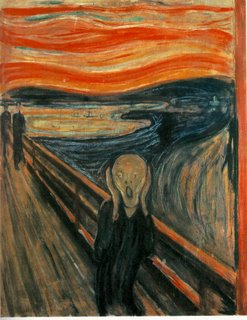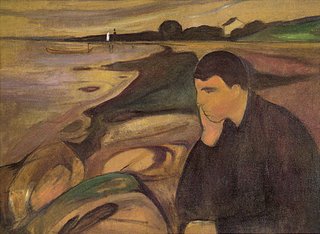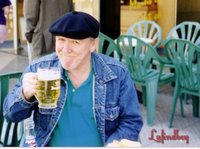Edvard Munch (1863-1944)

This painting, The Scream, was painted by Munch in 1893. He was thirty years old and his artistic career was in full swing. His art reflects the anxieties and pains of both his times and his own life. He was a troubled man. He lost his mother, his brother, and his sister while he was still very young. His father died when he was twenty-six. He suffered from depression, alcoholism, and chronic illness. He once said that..."sickness, insanity and death were the angels that surrounded my cradle and they have followed me throughout my life".

This painting is called Melancholy, painted in 1891. Many of his paintings appear pessimistic and grim, but they are also haunting and touching. He, like the impressionists that inspired him, was not interested in representational art. He was more interested in engaging humanity and inviting them into the realm of the heart and mind. He explained it thus:
"We want more than a mere photograph of nature. We do not want to paint pretty pictures to be hung on drawing-room walls. We want to create, or at least lay the foundations of, an art that gives something to humanity. An art that arrests and engages. An art created of one's innermost heart."

The influence on Munch by the Impressionists, in style, purpose, colour, and subject matter, can be seen in this painting called Man in Cabbage Field, painted in 1916. Works by Cezanne, Van Gogh, and Gauguin are recalled when looking at Munch's art, and all of these are among my favourites.
There is a place in my mind where "The Scream" is well known and reflected. Whenever the noise that passes for music thunders from the flat upstairs, and whenever I hear politicians drone about their reasons for going to war, my soul is one with that marvellous painting. And anyone who has felt lonliness and despair, sorrow and loss will know the truth of Munch's art. Although influenced by others, he has marked his place in art by his own unique style. His subjects, human and vulnerable, are what gives meaning and life to his work.

